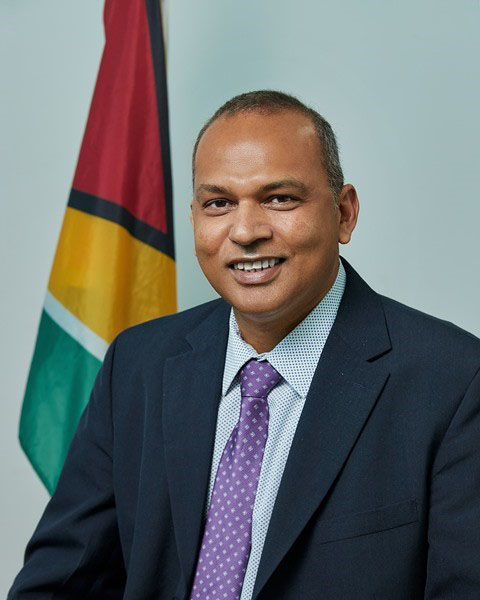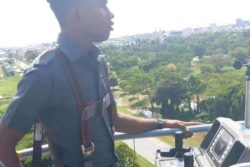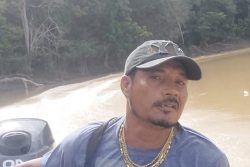Minister of Health Dr Frank Anthony yesterday said the order of vaccines for persons exposed to the monkeypox viral disease that the ministry has been able to procure is expected to be shipped into the country by the end of September.
Addressing the subject during his daily COVID-19 update on Wednesday, Anthony noted that there is working ongoing on three different anti-retroviral treatments, which are in limited supply in the United States and being used under emergency use authorisation.
“So the medications that are currently used to suppress the virus [are] not readily available. But once it becomes available we will ensure we will have some of it available to patients here in Guyana but right now we can’t get access to it,” he said.
However, he said to ensure that Guyana has vaccines for those persons who are exposed, an order has been placed through the Pan American Health Organisation (PAHO).
“And we are expecting that we will get some of those vaccines by the end of September…the supply of these vaccines are very limited and it’s a very scarce commodity right now in the world, but nevertheless we are trying to get some doses into Guyana for persons who might be exposed.”
The Minister in his daily COVID update further went on to explain that infected persons would be treated based on each symptoms of the monkeypox virus and that their recovery phase would last between fourteen and twenty-one days.
“So the treatment for these persons when they get infected would be symptomatic, therefore if they have fever, we will treat fever, if they have an enlarged lymph node we will treat that,” he noted before adding that there are very few examples where infected persons would develop some complications because of secondary bacterial infections.
“…So on top of the monkeypox, they might get another bacteria invading the lesions that they have and creating an additional disease,” he noted.
Anthony highlighted that persons who have been vaccinated against smallpox have a lower chance of contracting the virus.
“They (smallpox and monkeypox) are in the same family but what has been shown, persons who are older than forty, more than likely might have received a vaccine for smallpox and if you had such a vaccine then it helps to prevent you from getting monkeypox because it’s effective both for smallpox and monkeypox, but the world has eliminated smallpox and therefore we have stopped vaccinating people for smallpox…hence you see the resurgence of things like monkeypox,” he said.
Outbreak not inevitable
Anthony yesterday told Stabroek News that his ministry does not anticipate an outbreak of the virus but he is still cautioning the public to take preventative measures and be responsible and report if they experience any symptoms.
“If anybody feels they were exposed they should call into the hotline assigned. The same COVID hotline they can call and somebody would answer and we would send out a response team,” he said yesterday.
“We have measures to make the diagnosis and treat the cases, so we have the capacity…but I want to tell the public not to panic because this one transmission by no means mean we will have an outbreak…,” he added.
Monkeypox, which causes pus-filled blisters that crust over and fall off, is spread by coming into contact with a person or an animal infected with the virus.
Anthony on Monday announced that Guyana has confirmed its first monkeypox case.
Details about the patient have not been released by the ministry save for the fact that he is a Region Four resident in his 50s.
This newspaper understands that the man is a taxi driver and he does not have his childhood clinic card available.
Anthony explained that contact tracing of persons that the man came into contact with has begun, and family members he lives with and those he remembers interacting with are currently in home quarantine and being assessed. “People the patient was in contact with, we will have them in quarantine and they will be observed for 21 days, the maximum period for incubation,” he said.
Explaining that monkeypox takes at about one to weeks after contact with an infected person before symptoms begin to exhibit, Anthony explained that finding all of the persons the public transport driver was in contact with “is hard”.
He said that the man remains a patient at the Infectious Diseases Hospital at Lilliendaal and will stay until fully recovered. He is responding to treatment well and is expected to make a full recovery.
Last month, the World Health Organization (WHO) declared the growing monkeypox outbreak a global health emergency, its highest level of alert. With the announcement, the ministry had noted that the current world outbreak is caused by the less severe West African clade.
On Monday, Anthony had said that the ministry has been preparing and taking precautions to ensure detection, including laboratory diagnosis.
He echoed most of what he said then yesterday.
“I want the public to know that we have diagnostic capabilities. We have our labs that are prepared, we have a lot of people who have been trained. Over the last couple of months, we have trained a number of physicians, we have trained a number of laboratory staff, [so] just in case if we have cases, [we know] what to do,” he had said.
At the same time, Anthony urged the citizens against panicking, while pointing out that monkeypox is not readily transmissible as it would require “very, very close contact” with an infected person and lesions on their skin for an infection to occur.
He also highlighted the success in the region thus far with managing cases in order to reassure the public of the unlikelihood of wide transmission. He pointed to cases in Cuba, Barbados, Jamaica and the Bahamas. “So once you manage it properly, you are not going to see a lot of people getting sick,” he said.
While the Ministry has test kits for monkeypox, according to Anthony, the government will have to buy more to ensure there is adequate stock.








